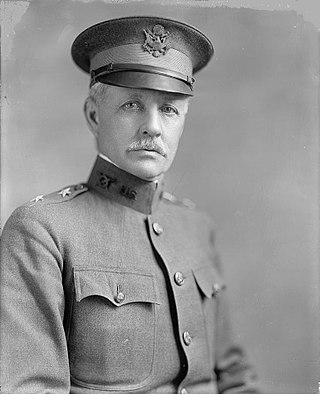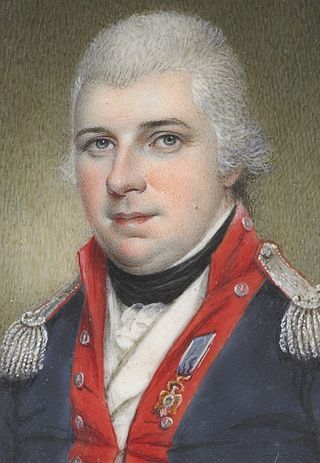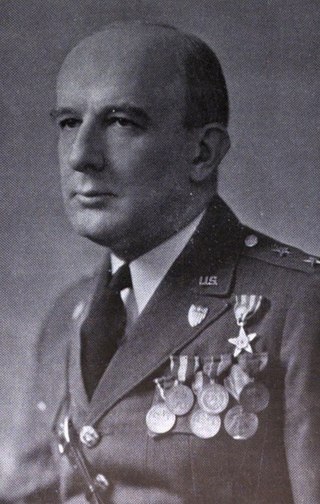Abimael Youngs Nicoll | |
|---|---|
| Born | New York |
| Allegiance | United States of America |
| Service | United States Army |
| Years of service | 1791–1814 |
| Rank | Colonel |
| Commands | Adjutant General of the U.S. Army Inspector General of the U.S. Army (acting) |
| Relations | John Cochran Nicoll (son) |
Abimael Youngs Nicoll was an American military officer who served as Adjutant General and acting Inspector General of the U.S. Army from 1807 to 1812. He held the rank of colonel.

John Loomis Chamberlain was career officer in the United States Army. A veteran of the American Indian Wars, Spanish–American War, Philippine–American War, and World War I, he attained the rank of major general and was most notable for his service as Inspector General of the United States Army from 1917 to 1921.

Edward Davis Townsend was an American military officer who was Adjutant General of the United States Army from 1869 to 1880. In 1861, then-Lieutenant Colonel Townsend was the first to propose the idea for the Medal of Honor.

Roger Jones served as Inspector General of the U.S. Army from 1888 to 1889. His father by the same name served as Adjutant General of the U.S. Army from 1825 to 1852.

George Andrews was an American military officer who was Adjutant General of the United States Army from 1912 to 1914.

Thomas Humphrey Cushing was an American military officer in the Continental Army, and later the United States Army. A veteran of the American Revolutionary War and the War of 1812, he attained the rank of brigadier general. He later served as collector of customs for the Port of New London, Connecticut.

Daniel Parker was an American military officer who served as Adjutant General, Inspector General and Paymaster-General of the U.S. Army, and as Chief Clerk of the War Department.

Charles Josephus Nourse was an American military officer who served as acting Adjutant General of the U.S. Army from 1822 to 1825.
Henry De Butts was an American military officer who served as acting Adjutant General and acting Inspector General of the U.S. Army from 1792 to 1793.
Michael Rudolph (1758–1795) was an American military officer who served as acting Adjutant General and acting Inspector General of the U.S. Army in 1793.
Jonathan Haskell was an American military officer who served as acting Adjutant General and acting Inspector General of the U.S. Army in 1796. After the war he returned to farm in Belpre, Ohio.

John Pratt was an officer in the United States Army who served as acting Adjutant General of the U.S. Army from 1790 to 1791.
John Mills was an American military officer who served as acting Adjutant General and acting Inspector General of the U.S. Army from 1794 to 1796.

James Fuller McKinley was an American military officer who served as Adjutant General of the United States Army from 1933 to 1935. He attained the rank of major general.

Walter Lawrence Reed was a major general in the United States Army who served as Inspector General of the Army from 1 December 1935 to 23 December 1939. His father was Army Medical Corps officer Major Walter Reed, namesake of the Walter Reed Army Medical Center. He was born in Fort Apache, Arizona, and moved to Washington, D.C., where he spent most of his early life. Reed fought in the Spanish–American War and traveled across the country and to the Panama Canal Zone. He then began working as an inspector during World War I and became the inspector of Base Section Number 5 in February 1919 then worked in the American Expeditionary Forces office. For his work he earned the Distinguished Service Medal. Reed attended various military schools before returning to the Inspector General's department. In 1935 he became the inspector general of the United States Army. He retired in 1940, but was recalled to active duty during World War II, filling a role in the War Department until 1946. Reed died in the Walter Reed Army Medical Center in 1956.

The Office of the Inspector General of the United States Army (OTIG) is the agency tasked with investigating the United States Army. Its stated mission is to "provide impartial, objective and unbiased advice and oversight to the army through relevant, timely and thorough inspection, assistance, investigations, and training". The position of Inspector General (IG) has existed since 1777, when Thomas Conway was appointed, and the office has been reorganized many times, varied in size dramatically, and abolished on several occasions before being reinstated. In its early days, the inspectorate was frequently merged with, or proposed to be part of, the Adjutant General's department.

The Office of the Inspector General(OTIG) serves to "provide impartial, objective and unbiased advice and oversight to the Army through relevant, timely and thorough inspection, assistance, investigations, and training." The position has existed since 1777, when Thomas Conway was appointed the first inspector. The department was reorganized many times, and almost abolished on several occasions. In its early days, the department was frequently merged with, or proposed to be part of the Adjutant General. It expanded greatly after the American Civil War, to the point that it had around 2,000 officers in 1993. The current holder of the position is Donna W. Martin.

John Fisher Preston Jr. was an American army officer who rose to the rank of Inspector General of the United States Army. His first conflict was the Spanish–American War serving in the 7th Infantry, and fighting in the Battle of San Juan Hill and Siege of Santiago. For his service in the war, Preston received the Silver Star. He then spent around a decade serving at various forts in the Philippines and across the United States. Preston was involved in the Quartermaster Corps and the Pay Department until the outbreak of World War I, serving a couple of years in France. He attended various Army schools until 1923, and had various leadership positions in the Army over the next fifteen years, culminating in appointment as Inspector General in 1931. After a four-year tenure and brief stationing at Fort Sam Houston, he retired from the army in 1936 and entered the banking industry in San Antonio. He died on July 1, 1960.